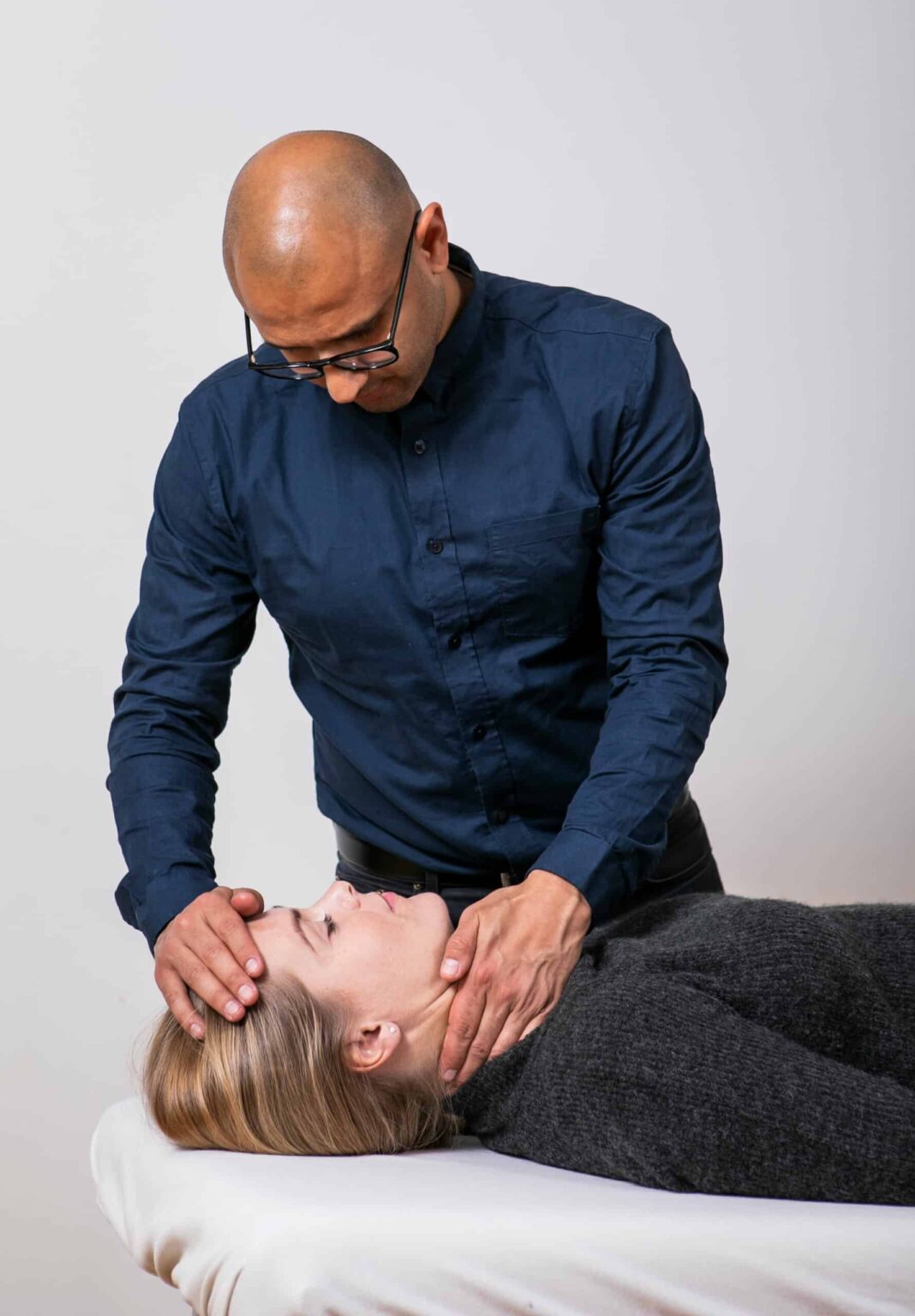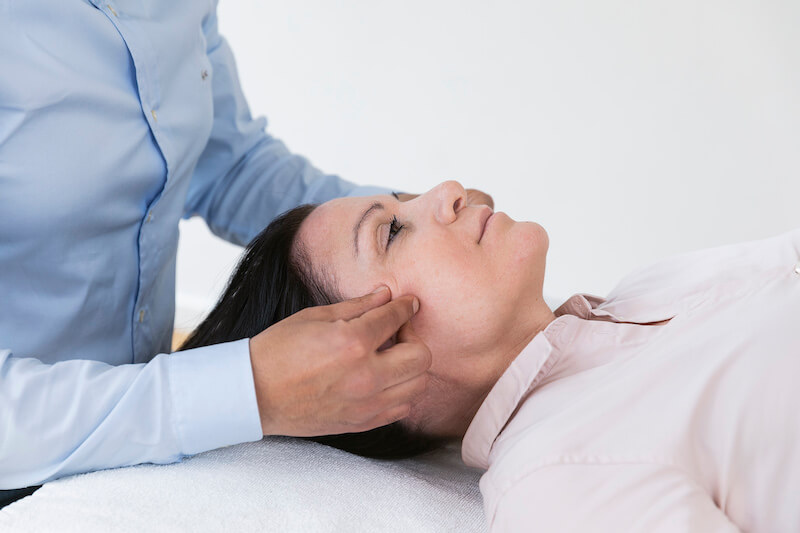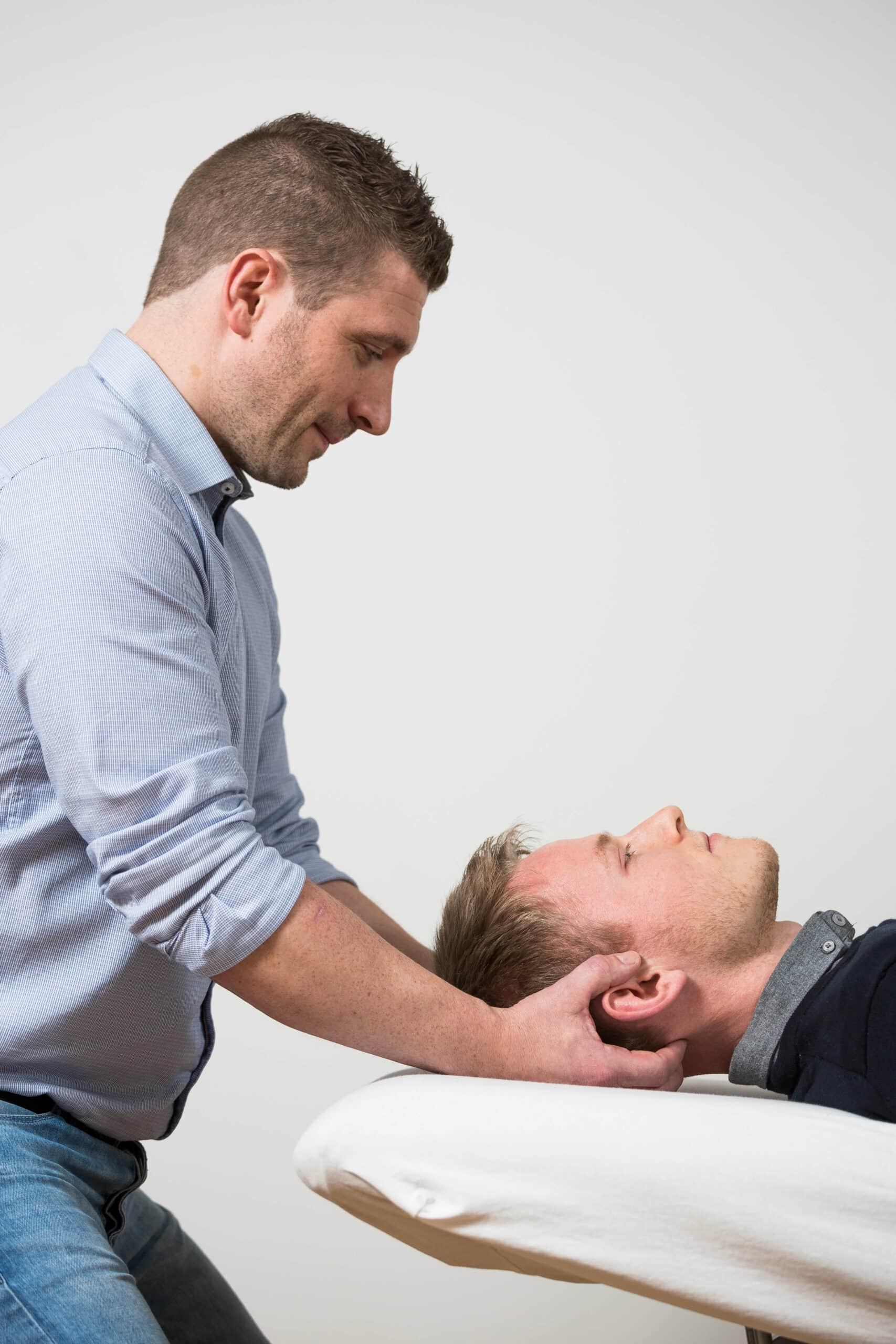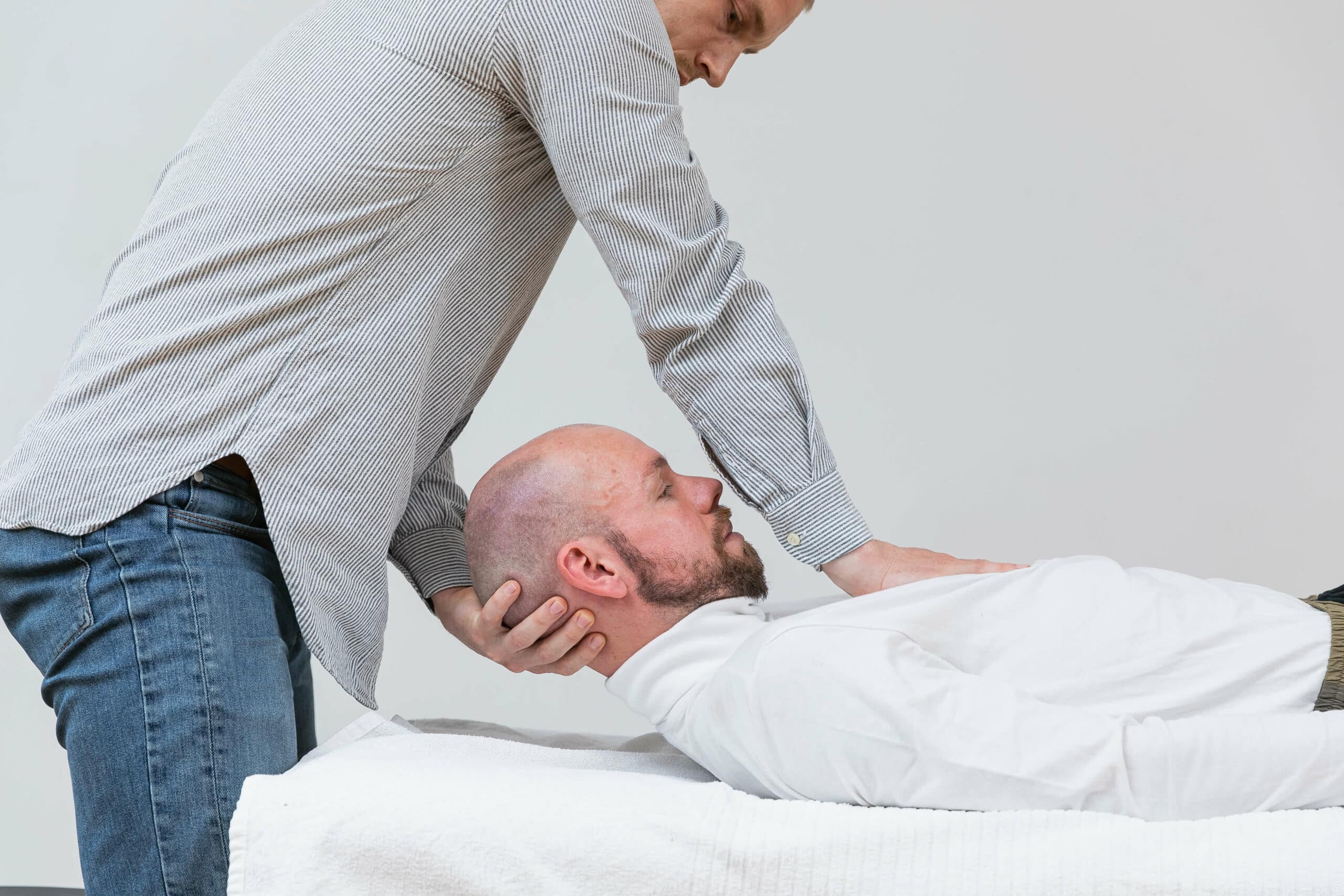We treat
Pinched nerve in the neck
Learn more about pinched neck nerves
Pinched nerve in the neck
Many people experience a pinched nerve in the neck, also known as cervical radiculopathy. The problem is more common among people in the 50-55 age group according to American studies, but in general the incidence is higher from the age of 40.
Jump to section [Show]
What is a pinched nerve in the neck?
Cervical radiculopathy is when the nerve either becomes compressed, irritated, or trapped between two structures in an area, such as between a ligament and a bone.
The neck consists of 7 cervical vertebrae (the cervical vertebrae) and between each cervical vertebra there is one disc (a cushion). If a disc becomes damaged, irritated or broken down with age, it can lead to discomfort in the surrounding nerves. This can cause symptoms such as tingling, buzzing or a tingling sensation in the arms and fingers. In addition, pain is also a frequent symptom, which can be experienced in the neck, shoulders, arms, hands and fingers. One’s mobility can therefore be reduced and it is not unusual to experience reduced muscle strength when a nerve is pinched in the neck.
Source: Sundhed.dk and sundhed.dk

Symptoms of a pinched nerve in the neck
Symptoms of a pinched nerve in the neck can vary greatly from person to person, as it depends on where the nerve is pinched/irritated/compressed, as well as the degree of this.
The symptoms from the neck will vary depending on which nerve is pinched. In the neck we have a nerve group called Plexus Cervicalis (from the upper cervical vertebrae, C1-C4/5) which, among other things, supplies the neck muscles and the breathing muscles. Symptoms from a nerve in the neck can therefore cause symptoms in these areas.
A pinched nerve in the neck is typically more likely to originate in the lower cervical vertebrae. Here, a group of nerves (from the lower cervical vertebrae, C5-T1) runs out to the shoulder, arm and fingers. This group is called the Brachial Plexus. The group of nerves originates from several of the lower cervical vertebrae and supplies different parts of the arm. Therefore, the symptoms can vary greatly.
Typical symptoms may include:
- Pain – the pain may be localized in the neck, arm and/or fingers. The nature of the pain may be experienced as a sharp, stabbing, burning, buzzing, tingling and/or radiating sensation.
- Numbness and tingling – this will be experienced in the area of the neck, shoulder, arm, and/or fingers that the nerve in question supplies.
- Reduced muscle strength – it is possible to experience weakness in the shoulder, arm and/or fingers, which can cause difficulty in gripping, lifting and performing certain movements, including fine motor skills.
- Decreased reflexes – disturbances may occur in the shoulder, arm and/or fingers supplied by the nerve in question.
Causes of a pinched nerve in the neck
A pinched nerve in the neck can be caused by many different reasons, including:
- Disc herniation – if the disc (the cushion) shifts towards the outer layer of the disc or through the disc membrane, it can cause pressure on the surrounding nerves.
- Degenerative changes – with age, natural changes occur in the bone structure, discs, and stenosis (narrowing of the spinal canal), which can cause irritation of the nerves.
- Neck injuries – e.g. previous herniated disc, fracture, displacement of vertebrae or traffic accident, can cause a nerve to become pinched in the neck, either immediately after an injury or after a longer period of time (weeks, months) after the injury.
- Neck changes – repetitive strain and/or postural positions can cause increased stress on certain neck structures, which over time can result in a pinched nerve in the neck.
- Spinal stenosis – a process in which the spinal canal narrows over time, which can cause increased pressure on the spinal cord and nerve roots, which can result in a pinched or irritated nerve.
Source: sundhed.dk

Duration of a pinched nerve in the neck
People with a pinched nerve in the neck are most often recommended a non-surgical treatment approach, including physiotherapy and osteopathy. These conservative treatments can alleviate the problem by creating peace around the nerve in question, rather than surgical intervention.
The duration of a pinched nerve in the neck will vary from person to person, however, symptoms can usually be reduced within a few weeks. Symptoms should be significantly reduced within a few months, typically 3-4 months.
Source: sundhed.dk
Studies show that over 85% of people who have experienced an acute pinched nerve in the neck improve within 8-12 weeks.
Source: ncbi.nlm.nih.gov
Nerve compression in the neck and dizziness
Dizziness can occur as a result of a pinched nerve in the neck. This is because the 8th cranial nerve, N. Vestibulocochlear, can become irritated, compressed or pinched, causing balance problems due to disruptions in fluid and the balance centers in the ear.
It may be a good idea to see a doctor if you experience dizziness and/or hearing problems, to clarify whether there may be another underlying pathology.
Treatment of pinched nerve in the neck: traditional treatment
Short term
Conservative/non-surgical treatment may consist of manual stretching, stretching of the connective tissue (fascia), muscles and ligaments in the areas surrounding the affected nerve to relieve the compression/irritation. In addition, it is important to find some movements that can be performed daily, without provoking the symptoms and to minimize the movements that provoke. Rest and relaxation may also be necessary for shorter intervals to relieve pressure in the affected area.
Long term
Conservative/non-surgical treatment will focus on regaining full range of motion, strength, and stability in the area affected by nerve compression in the neck. The focus will be on helping the body return to balance, where the structures in and around the neck function as normal.
Source: sundhed.dk and sundhed.dk

Osteopathy and pinched nerve in the neck
We, as physiotherapists and osteopaths, can help you with a pinched nerve in your neck in several different ways, including:
- Investigate and diagnose – clarify your symptoms and your problem.
- Pain relief – by using various relevant manual techniques to release tension, create better conditions in the tissue and irritated area.
- Increase mobility and function in the areas affected – including joints, muscles, connective tissue (fascia) and nerves.
- Guidance of relevant exercises – stretching, strength and/or stability exercises.
- Advice – regarding resolving the problem and preventing/reducing the risk of recurring problems.
The treatment by physiotherapists and osteopaths at Aarhus Osteopathy adapts the treatment course to the individual’s symptoms.
Source: nhs.uk
Osteopathic approach to neck and head pain
- Finding and optimising the areas the neck had to compensate for so that the pain/irritation has time to heal.
- To optimise blood circulation in the area. Treatment of the heart, lungs, chest, respiratory muscles, liver, intestines and left kidney is important.
- To ensure optimal function and mobility around the upper cervical vertebrae and skull as well as the upper thoracic vertebrae, as this area is crucial for blood flow and the autonomic nervous system.
- To optimize the function and mobility of the cervical vertebra itself corresponding to the pain in the neck.
- To optimize the immune system, diet and lifestyle, and to treat the adrenal glands.

How do you loosen up your neck?
- Seek out a therapist who can help you release tension, irritation, and the like in the affected areas.
- Pay attention to your posture, make sure to give your body the best possible conditions to reduce pressure on the nerve that is pinched in the neck.
- Try some exercises. You can get inspiration from the video on this page.
What to do about a pinched nerve in the neck?
- See a doctor, osteopath, physiotherapist or similar to clarify what the problem is and what can be done to remedy it.
- Stay active as much as possible without exacerbating/provoking your symptoms.
- Take some breaks every now and then to give your body a rest.

Often related problems

Hypermobility in babies and children

Muscle tension or imbalances in babies and children

Neck strain

Pinched nerve in the neck

Disc herniation in the neck

